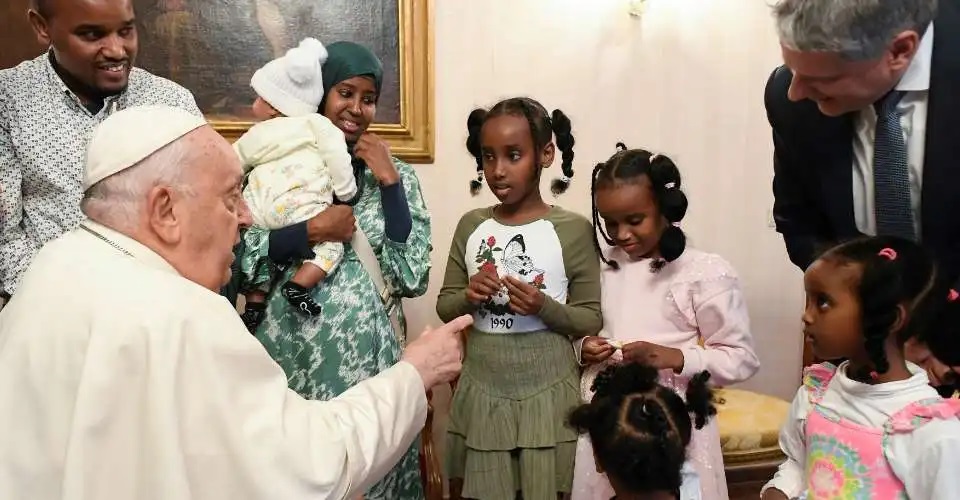A pope who campaigned for an inclusive Church
Pope Francis left the door open to the world's marginalized and maligned
Apr 21, 2025

VATICAN: Francis pushed hard to implement the spirit of the Second Vatican Council (1962-65) — which rejected a clericalist, hierarchical Church and saw the Church as the “People of God” — and sought to emphasize that all baptized Catholics were entitled to equal rights, responsibility and respect within the Church.
Francis said he did not want bishops who wanted to act like "princes" and didn't want to lead people as "pastors" without being "authoritarian." He ridiculed Church officials who acted like a "religious border patrol" and made it harder for single mothers or misled Catholics from being reunited with the Church and denied them Church sacraments.
Even atheists can go to heaven
In May 2013, Pope Francis surprised everyone when he said even atheists could go to heaven if they lead good and honorable lives. In a homily he reportedly said: "The Lord has redeemed all of us, with the Blood of Christ, all of us, not just Catholics. Everyone!" When he was asked, "Father, the atheists?" He replied, "Even the atheists. Everyone!"
Who am I to judge?
In July 2013, during a press conference on a flight back from a visit to Brazil, Francis famously said, "If someone is gay and he searches for the Lord and has good will, who am I to judge?"
Later in a statement, Francis said, "It is deplorable that homosexual persons have been and are the object of violent malice in speech or in action. Such treatment deserves condemnation from the Church's pastors wherever it occurs."
In December 2023, Francis sparked a global debate when he approved blessings for same-sex couples. The Vatican later clarified that Catholic priests could administer blessings to same-sex couples as long as they were not part of regular Church rituals or liturgies.
Transgender people are welcome
In January 2015, Pope Francis quietly welcomed and met 48-year-old Spanish citizen, Diego Neria Lejarraga, at the Vatican.
Born as a woman, Lejarraga later underwent surgery to become a transgender man. A Spanish priest once called Lejarraga "the devil's daughter" and Pope Francis seemingly sought to offer solace to Lejarraga by meeting him.
During the meeting, Lejarraga asked the pope if there was a place in the Church for him and Francis reportedly responded by embracing him.
Forgiveness for abortion
In September 2015, Francis opened a special, temporary "mercy window" to make it easier for women who had undergone abortions to confess and return to the Church.
Like many of his actions, it was a symbolic gesture as abortion is considered a "mortal sin" in the Church. Francis didn't change the Church's stance on abortion, but the gesture marked a new tone.
Welcoming the divorced and remarried
In October 2015, Pope Francis convened a Synod of Bishops to discuss marriage and family life. Following the meeting, Francis simplified a lengthy and rigorous marriage annulment procedure. He allowed bishops rather than a Church court to nullify a marriage, a power that they could also give to priests. He also asked the clergy to keep doors open to Catholics who divorce and remarry.
Compassion for refugees
Francis was born as Jorge Mario Bergoglio to Italian immigrants in Argentina on Dec. 17, 1936. His father Mario was an accountant with the railways and his mother Regina Sivori was a housewife who raised their five children. Francis was the eldest child.
According to his sister and now his only living sibling — María Elena Bergoglio — their parents were not economic migrants but had escaped the fascist rule of Benito Mussolini in Italy.
Refugees and migrants have been always close to his heart, possibly because Francis himself was a child of migrants and knew firsthand the pain and suffering they faced in their adopted countries.
As pope he welcomed refugees at the Vatican and made various trips to meet and comfort them, such as in 2017 when he met Rohingya Muslim refugees who fled persecution in Myanmar and settled in neighboring Bangladesh. He called Rohingya “the presence of God today.”
Pope Francis urged the world to show compassion for refugees and migrants, and to welcome and integrate them into society during a general audience on Aug. 28, 2024.
He called for safe pathways for migrants, and for an end to indifference and discrimination. He called for “a renewed and deepened look, capable of embracing the faces and stories of those who cross borders in search of hope.”
He slammed global indifference towards migrants and refugees, calling it “a scandal.”
Women empowerment
Francis also made an unprecedented move to raise the dignity of women in the Church. He appointed women in major Vatican posts including as full members of various dicasteries. He emphasized the role of women in development and peacebuilding in the world by praising their "tender hearts" and "ability to construct a more humane society."
Synodality: The Grand Vision
In 2023, Francis convened the Synod on Synodality in the Catholic Church. The two-year-long global effort for synodality was considered the culmination of his papacy and the most important event since the Second Vatican Council.
The Synod on Synodality was Francis’ “grand vision for the millennium of the Church,” late Indian theologian Felix Wilfred noted.
The synodality promoted by Francis envisioned “a theological transition of the Church” from a strongly hierarchical one to a synod of all Catholic people, which requires “structural changes,” Felix added.--ucanews.com







Total Comments:0